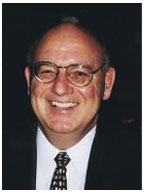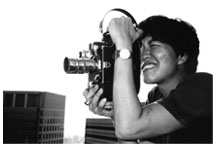October 10, 2001: Class Notes
To our readers: These Class Notes columns were written and submitted before September 11, 2001. Please read their tone and content with that in mind.
Class Notes Profiles:
Advocate
for the underdog
People’s lawyer Julian McPhillips ’68 is on a mission
Telling
stories
Filmmaker Joanne Shen ’94 eats life
Email your class notes...many secretaries have email. Check our online Class Secretaries Directory.
Advocate
for the underdog
People’s
lawyer Julian McPhillips ’68 is on a mission
 McPhillips
helped found an Episcopal Church in Montgomery, Alabama.
McPhillips
helped found an Episcopal Church in Montgomery, Alabama.
Julian L. McPhillips, Jr. ’68,
a trial attorney in Montgomery, Alabama, is used to taking on big challenges.
Backed by his 10-lawyer firm, he twice managed to overturn laws used to
harass poor residents in Montgomery. He has won race-, sex-, and age-discrimination
cases against dozens of employers. He once halted a governor’s taxpayer-funded
flights to for-profit preaching gigs. (The Alabama governor was also a
preacher.) He’s helped residents keep nuclear plants and hazardous-waste
dumps out of their neighborhood. And he’s won acquittals in each
of the five death-penalty cases he’s taken on.
But call McPhillips a “crusader”
for the underprivileged and he momentarily backs off. “That word
conjures up different images,” says McPhillips, who majored in history
at Princeton. “Some people assume that it means ‘tilting at
windmills.’ Only one percent of my cases make the news. The others
help make the firm money.” Even so, most of those cases tend to be
populist in nature.
“Life’s greatest
meaning and purpose comes from helping other people,” says McPhillips,
profiled by Carroll Dale Short last year in The People’s Lawyer:
The Colorful Life and Times of Julian L. McPhillips, Jr. (NewSouth Books).
Along with his wife, Leslie, McPhillips is among the founders of Christ
the Redeemer Episcopal Church in Montgomery and is raising two daughters
and one son. According to the book, McPhillips and his wife have been
involved in spiritual healing — laying hands on individuals to help
restore health.
McPhillips’s next big
mission is going after a seat in the U.S. Senate, running as a Democrat.
It won’t be easy. Alabama is often unfriendly territory for Democrats,
and McPhillips faces a tough primary battle leading up to next June’s
vote before he even gets a shot at Jeff Sessions, the incumbent Republican
senator. He’s shifting his focus to the political arena, he says,
because he wants to “go from ‘the People’s Lawyer’
to being ‘the People’s Senator,’ responding to the needs
of everyday Americans.”![]()
By Louis Jacobson ’92
Louis Jacobson covers politics for National Journal magazine in Washington,
D.C.
Telling
stories
Filmmaker Joanne
Shen ’94 eats life
 Shen’s
film A Neon Life documents the work of artists who create neon signs.
Shen’s
film A Neon Life documents the work of artists who create neon signs.
One evening last June, just
hours before she was scheduled to leave for a shoot in Cambodia, independent
documentary filmmaker Joanne Shen ’94 received word that the driver
she’d hired to escort her crew and their 300 pounds of equipment
through the streets of Phnom Penh had backed out. For a film producer,
this is the equivalent of a football coach having a key player sprain
his ankle the night before a playoff game. These are not the moments Shen
lives for.
While shooting another film,
her award-winning A Neon Life, about artists who make neon signs, she
strapped on a harness and hung from the side of a skyscraper, camera in
hand, to capture an installation in progress on a building in Oakland,
California. Now, that’s her kind of adrenaline rush.
“There are times when
I’m shooting when I literally feel like I’m eating life, it’s
that exciting,” says Shen, who lives in San Francisco.
Shen, who managed to find another driver for her shoot in Cambodia, found
plenty of excitement there, too. As the associate producer for a PBS documentary
on labor conditions in Southeast Asia, she knew she would be stepping
into controversial territory. What she didn’t anticipate was how
much access her team would have during their two-week stay. They took
their cameras inside sweatshops, filmed a strike in action, and interviewed
people from all walks of life — from garment factory owners to the
workers living in wooden shantytowns. The documentary, part of a PBS series
titled Livelyhood, aired in September.
Shen got her start in filmmaking in Hong Kong, where, in 1997, she was freelancing for a weekly newspaper and looking for a change of pace.
That’s when she caught
wind of an 80-year-old graffiti artist who uses calligraphy ink and paintbrushes
to make his mark. Shen joined forces with a local television producer
to direct King of Kowloon, a 30-minute documentary that went on to tour
the U.S. festival circuit.
Working on King of Kowloon,
says Shen, taught her an important lesson: In documentary filmmaking,
finding an intriguing subject is paramount. No matter how compelling the
story, the person on screen makes it come alive for an audience.
What does she look for in a
subject? “I’m attracted to visionaries,” Shen says: People
like Ted Hayes, an activist for the homeless in Compton, California, who
started a cricket team for inner-city kids. Hayes and his team are the
subjects of Cricket Outta Compton, a movie Shen directed while attending
Stanford University’s documentary film program from 1997 to 1999.
The film landed her a semifinalist spot in the Student Academy Awards,
and won first place in the Black Maria Film Festival, which tours the
nation. (For more on Shen’s films, go to www.joanneshen.com.)
Thinking back to Princeton,
Shen, an English major, credits her undergraduate education with laying
the theoretical groundwork for her career. John McPhee ’53, whose
nonfiction writing class taught her to be meticulous with details, was
a key influence. Today, Shen is still focused on the details, but the
payoff comes in celluloid. ![]()
By Tamar Laddy ’94
Tamar Laddy is a film student at the University of Southern California.
